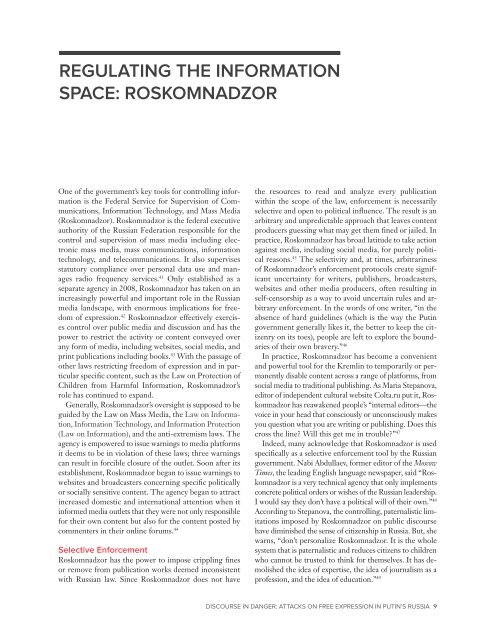DISCOURSE IN DANGER
2poGcgOv3
2poGcgOv3
You also want an ePaper? Increase the reach of your titles
YUMPU automatically turns print PDFs into web optimized ePapers that Google loves.
REGULAT<strong>IN</strong>G THE <strong>IN</strong>FORMATION<br />
SPACE: ROSKOMNADZOR<br />
One of the government’s key tools for controlling information<br />
is the Federal Service for Supervision of Communications,<br />
Information Technology, and Mass Media<br />
(Roskomnadzor). Roskomnadzor is the federal executive<br />
authority of the Russian Federation responsible for the<br />
control and supervision of mass media including electronic<br />
mass media, mass communications, information<br />
technology, and telecommunications. It also supervises<br />
statutory compliance over personal data use and manages<br />
radio frequency services. 41 Only established as a<br />
separate agency in 2008, Roskomnadzor has taken on an<br />
increasingly powerful and important role in the Russian<br />
media landscape, with enormous implications for freedom<br />
of expression. 42 Roskomnadzor effectively exercises<br />
control over public media and discussion and has the<br />
power to restrict the activity or content conveyed over<br />
any form of media, including websites, social media, and<br />
print publications including books. 43 With the passage of<br />
other laws restricting freedom of expression and in particular<br />
specific content, such as the Law on Protection of<br />
Children from Harmful Information, Roskomnadzor’s<br />
role has continued to expand.<br />
Generally, Roskomnadzor’s oversight is supposed to be<br />
guided by the Law on Mass Media, the Law on Information,<br />
Information Technology, and Information Protection<br />
(Law on Information), and the anti-extremism laws. The<br />
agency is empowered to issue warnings to media platforms<br />
it deems to be in violation of these laws; three warnings<br />
can result in forcible closure of the outlet. Soon after its<br />
establishment, Roskomnadzor began to issue warnings to<br />
websites and broadcasters concerning specific politically<br />
or socially sensitive content. The agency began to attract<br />
increased domestic and international attention when it<br />
informed media outlets that they were not only responsible<br />
for their own content but also for the content posted by<br />
commenters in their online forums. 44<br />
Selective Enforcement<br />
Roskomnadzor has the power to impose crippling fines<br />
or remove from publication works deemed inconsistent<br />
with Russian law. Since Roskomnadzor does not have<br />
the resources to read and analyze every publication<br />
within the scope of the law, enforcement is necessarily<br />
selective and open to political influence. The result is an<br />
arbitrary and unpredictable approach that leaves content<br />
producers guessing what may get them fined or jailed. In<br />
practice, Roskomnadzor has broad latitude to take action<br />
against media, including social media, for purely political<br />
reasons. 45 The selectivity and, at times, arbitrariness<br />
of Roskomnadzor’s enforcement protocols create significant<br />
uncertainty for writers, publishers, broadcasters,<br />
websites and other media producers, often resulting in<br />
self-censorship as a way to avoid uncertain rules and arbitrary<br />
enforcement. In the words of one writer, “in the<br />
absence of hard guidelines (which is the way the Putin<br />
government generally likes it, the better to keep the citizenry<br />
on its toes), people are left to explore the boundaries<br />
of their own bravery.” 46<br />
In practice, Roskomnadzor has become a convenient<br />
and powerful tool for the Kremlin to temporarily or permanently<br />
disable content across a range of platforms, from<br />
social media to traditional publishing. As Maria Stepanova,<br />
editor of independent cultural website Colta.ru put it, Roskomnadzor<br />
has reawakened people’s “internal editors—the<br />
voice in your head that consciously or unconsciously makes<br />
you question what you are writing or publishing. Does this<br />
cross the line? Will this get me in trouble?” 47<br />
Indeed, many acknowledge that Roskomnadzor is used<br />
specifically as a selective enforcement tool by the Russian<br />
government. Nabi Abdullaev, former editor of the Moscow<br />
Times, the leading English language newspaper, said “Roskomnadzor<br />
is a very technical agency that only implements<br />
concrete political orders or wishes of the Russian leadership.<br />
I would say they don’t have a political will of their own.” 48<br />
According to Stepanova, the controlling, paternalistic limitations<br />
imposed by Roskomnadzor on public discourse<br />
have diminished the sense of citizenship in Russia. But, she<br />
warns, “don’t personalize Roskomnadzor. It is the whole<br />
system that is paternalistic and reduces citizens to children<br />
who cannot be trusted to think for themselves. It has demolished<br />
the idea of expertise, the idea of journalism as a<br />
profession, and the idea of education.” 49<br />
<strong>DISCOURSE</strong> <strong>IN</strong> <strong>DANGER</strong>: ATTACKS ON FREE EXPRESSION <strong>IN</strong> PUT<strong>IN</strong>’S RUSSIA 9


